Historians:

Yuval Noah Harari
Prof. Yuval Noah Harari has a PhD in History from the University of Oxford and lectures at the Hebrew University of Jerusalem, specializing in world history. His books have been translated into 65 languages, with 40 million copies sold worldwide. ‘Sapiens: A Brief History of Humankind’ (2014) looked deep into our past, ‘Homo Deus: A Brief History of Tomorrow’ (2016) considered far-future scenarios, and ’21 Lessons for the 21st Century’ (2018) zoomed in on the biggest questions of the present moment. ‘Sapiens: A Graphic History’ (launched in 2020) is a radical adaptation of ‘Sapiens’ into a graphic novel series, which Harari created and co-wrote in collaboration with comics artists David Vandermeulen (co-writer) and Daniel Casanave (illustrator).

Jung Chang
Jung Chang is the author of Wild Swans: Three Daughters of China (1991), which has sold more than 15 million copies worldwide, except in China where it is banned, as are all of her other books. She wrote a ground-breaking trilogy of the history and personalities of modern China: Mao: The Unknown Story (2005, with Jon Halliday), which was described by Time magazine as “an atom bomb of a book”; Empress Dowager Cixi: The Concubine Who Launched Modern China (2013), a New York Times “notable book”; and Big Sister, Little Sister, Red Sister: Three Women at the Heart of Twentieth-Century China (2019), which is regarded as “a monumental work” (Spectator, UK).
Science / Religion:
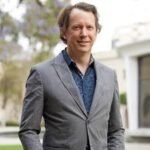
Sean M. Carroll
Carroll received his PhD in astronomy in 1993 from Harvard University, where his advisor was George B. Field. His dissertation was entitled Cosmological Consequences of Topological and Geometric Phenomena in Field Theories. He worked as a postdoctoral researcher at the Massachusetts Institute of Technology (MIT) and Kavli Institute for Theoretical Physics at the University of California, Santa Barbara and as an assistant professor at the University of Chicago until 2006 when he was denied tenure. He is the Homewood Professor of Natural Philosophy at Johns Hopkins University, teaching in both the Department of Philosophy and The Department of Physics and Astronomy. Carroll has a B.S. in Astronomy, Astrophysics and philosophy from Villanova University in Pennsylvania.
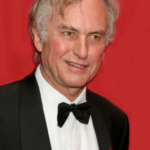
Richard Dawkins
Richard Dawkins taught zoology at the University of California at Berkeley and at Oxford University and is now the Charles Simonyi Professor of the Public Understanding of Science at Oxford, a position he has held since 1995. Among his previous books are The Ancestor’s Tale, The Selfish Gene, The Blind Watchmaker, Climbing Mount Improbable, Unweaving the Rainbow, and A Devil’s Chaplain. Dawkins lives in Oxford with his wife, the actress and artist Lalla Ward.

Michio Kaku
As part of the research program in 1975 and 1977 at the department of physics at the City College of the City University of New York, Kaku worked on research on quantum mechanics. He was a Visitor and Member (1973 and 1990) at the Institute for Advanced Study in Princeton and New York University. As of 2014, he holds the Henry Semat Chair and Professorship in theoretical physics at the City College of New York.
Between 1970 and 2000, Kaku had papers published in physics journals covering topics such as superstring theory, supergravity, supersymmetry, and hadronic physics. In 1974, Kaku and Prof. Keiji Kikkawa of Osaka University co-authored the first papers describing string theory in a field form.
Kaku is the author of several textbooks on string theory and quantum field theory. An explicit description of the second-quantization of the light-cone string was given by Kaku and Keiji Kikkawa.
Popular science
Kaku is most widely known as a popularizer of science and physics outreach specialist. He has written books and appeared on many television programs as well as film. He also hosts a weekly radio program. Kaku is the author of various popular science books:
Beyond Einstein: The Cosmic Quest for the Theory of the Universe (with Jennifer Thompson) (1987)
Hyperspace: A Scientific Odyssey through Parallel Universes, Time Warps, and the Tenth Dimension (1994)
Visions: How Science Will Revolutionize the 21st Century (1997)
Einstein’s Cosmos: How Albert Einstein’s Vision Transformed Our Understanding of Space and Time (2004)
Parallel Worlds: A Journey through Creation, Higher Dimensions, and the Future of the Cosmos (2004)
Physics of the Impossible: A Scientific Exploration into the World of Phasers, Force Fields, Teleportation, and Time Travel (2008)
Physics of the Future: How Science Will Shape Human Destiny and Our Daily Lives by the Year 2100 (2011)
The Future of the Mind: The Scientific Quest to Understand, Enhance, and Empower the Mind (2014)
The Future of Humanity: Terraforming Mars, Interstellar Travel, Immortality, and Our Destiny Beyond Earth (2018)
The God Equation: The Quest for a Theory of Everything (2021)
Quantum Supremacy: How the Quantum Computer Revolution Will Change Everything (2023)
Hyperspace was a bestseller and voted one of the best science books of the year by The New York Times and The Washington Post. Parallel Worlds was a finalist for the Samuel Johnson Prize for nonfiction in the UK.

Bart D. Ehrman
Bart Denton Ehrman is an American New Testament scholar focusing on textual criticism of the New Testament, the historical Jesus, and the origins and development of early Christianity. He has written and edited 30 books, including three college textbooks. He has also authored six New York Times bestsellers. Ehrman has written widely on issues of the New Testament and early Christianity at both an academic and popular level, much of it based on textual criticism of the New Testament. His thirty books include three college textbooks and six New York Times bestsellers: Misquoting Jesus, Jesus, Interrupted, God’s Problem, Forged, How Jesus Became God, and The Triumph of Christianity. More than two million copies of his books have been sold, and his books have been translated into 27 languages. Ehrman speaks extensively throughout the United States and has participated in many public debates, including debates with William Lane Craig, Dinesh D’Souza, Mike Licona, Craig A. Evans, Daniel B. Wallace, Richard Swinburne, Peter J. Williams, James White, Darrell Bock, Michael L. Brown, and Robert M. Price.
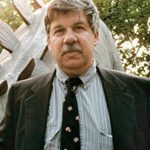
Stephen Jay Gould
(1941-2002)
Stephen was the Alexander Agassiz Professor of Zoology and Professor of Geology at Harvard University. He published over twenty books, received the National Book and National Book Critics Circle Awards, and a MacArthur Fellowship.Stephen Jay Gould (1941-2002) was the Alexander Agassiz Professor of Zoology and Professor of Geology at Harvard University. He published over twenty books, received the National Book and National Book Critics Circle Awards, and a MacArthur Fellowship.
Science:

Stephen Hawking
(1942-2018)
Stephen Hawking’s ability to make science understandable and compelling to a lay audience was established with the publication of his first book, A Brief History of Time, which has sold nearly 10 million copies in 40 languages. Hawking has authored or participated in the creation of numerous other popular science books, including The Universe in a Nutshell, A Briefer History of Time, On the Shoulders of Giants, The Illustrated On the Shoulders of Giants, and George’s Secret Key to the Universe.
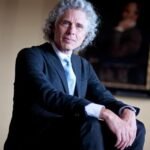
Steven Pinker
Steven Pinker is one of the world’s leading authorities on language and the mind. His popular and highly praised books include The Stuff of Thought, The Blank Slate, Words and Rules, How the Mind Works, and The Language Instinct. The recipient of several major awards for his teaching, books, and scientific research, Pinker is Harvard College Professor and Johnstone Family Professor of Psychology at Harvard University. He also writes frequently for The New York Times, Time, The New Republic, and other magazines.
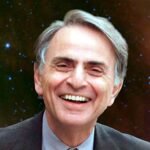
Carl Sagan
(1934-1996)
Carl Sagan was Professor of Astronomy and Space Sciences and Director of the Laboratory for Planetary Studies at Cornell University. He played a leading role in the Mariner, Viking, and Voyager spacecraft expeditions to the planets, for which he received the NASA medals for Exceptional Scientific Achievement. Dr. Sagan received the Pulitzer Prize and the highest awards of both the National Academy of Sciences and the National Science Foundation, and many other awards, for his contributions to science, literature, education, and the preservation of the environment. His book Cosmos (accompanying his Emmy- and Peabody Award-winning television series of the same name) was the bestselling science book ever published in the English language, and his bestselling novel, Contact, was turned into a major motion picture.
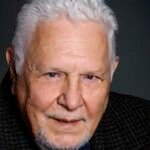
Victor John Stenger
(1935 – 2014)
Following a career as a research scientist in the field of particle physics, Stenger was associated with New Atheism and he authored popular science books. He published twelve books for general audiences on physics, quantum mechanics, cosmology, philosophy, religion, atheism, and pseudoscience, including the 2007 best-seller God: The Failed Hypothesis: How Science Shows That God Does Not Exist. His final book was God and the Multiverse: Humanity’s Expanding View of the Cosmos (2014). He was a regular featured science columnist for the Huffington Post. An advocate for removing the influence of religion from scientific research, commercial activity, and the political process, Stenger coined the quote: “Science flies you to the moon. Religion flies you into buildings”.
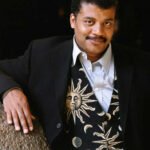
Neil deGrasse Tyson
Neil deGrasse Tyson was born in New York City the same week NASA was founded. His interest in the universe traces back to age 9, after a first visit to the Hayden Planetarium of the American Museum of Natural History. He was educated in the public schools of New York City through his graduation from the Bronx High School of Science. And after an BA in Physics from Harvard and a PhD in Astrophysics from Columbia and a Postdoctoral research fellowship at Princeton, Tyson became the Frederick P. Rose Director of the Hayden Planetarium, where he has served since 1996.
Civil Rights / Peaceful Non-Violent Protest / Religion:
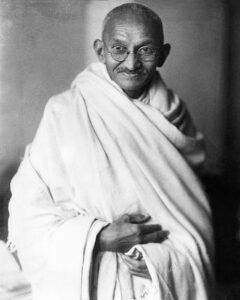
Mahatma Gandhi (1869-1948)
Mohandas Karamchand Gandhi was an Indian lawyer, anti-colonial nationalist and political ethicist who employed nonviolent resistance to lead the successful campaign for India’s independence from British rule. He inspired movements for civil rights and freedom across the world. The honorific Mahātmā (Sanskrit: “great-souled”, “venerable”), first applied to him in 1914 in South Africa, is now used throughout the world.
Born and raised in a Hindu family in coastal Gujarat, Gandhi trained in the law at the Inner Temple, London, and was called to the bar at age 22 in June 1891. After two uncertain years in India, where he was unable to start a successful law practice, he moved to South Africa in 1893 to represent an Indian merchant in a lawsuit. He went on to live in South Africa for 21 years. It was here that Gandhi raised a family and first employed nonviolent resistance in a campaign for civil rights. In 1915, aged 45, he returned to India and soon set about organising peasants, farmers, and urban labourers to protest against excessive land-tax and discrimination.
Assuming leadership of the Indian National Congress in 1921, Gandhi led nationwide campaigns for easing poverty, expanding women’s rights, building religious and ethnic amity, ending untouchability, and, above all, achieving swaraj or self-rule. Gandhi adopted the short dhoti woven with hand-spun yarn as a mark of identification with India’s rural poor. He began to live in a self-sufficient residential community, to eat simple food, and undertake long fasts as a means of both introspection and political protest. Bringing anti-colonial nationalism to the common Indians, Gandhi led them in challenging the British-imposed salt tax with the 400 km (250 mi) Dandi Salt March in 1930 and in calling for the British to quit India in 1942. He was imprisoned many times and for many years in both South Africa and India.
Gandhi’s vision of an independent India based on religious pluralism was challenged in the early 1940s by a Muslim nationalism which demanded a separate homeland for Muslims within British India. In August 1947, Britain granted independence, but the British Indian Empire was partitioned into two dominions, a Hindu-majority India and a Muslim-majority Pakistan. As many displaced Hindus, Muslims, and Sikhs made their way to their new lands, religious violence broke out, especially in the Punjab and Bengal. Abstaining from the official celebration of independence, Gandhi visited the affected areas, attempting to alleviate distress. In the months following, he undertook several hunger strikes to stop the religious violence. The last of these, begun in Delhi on 12 January 1948 when he was 78, also had the indirect goal of pressuring India to pay out some cash assets owed to Pakistan, which the Indian government had been resisting. Although the Government of India relented, as did the religious rioters, the belief that Gandhi had been too resolute in his defence of both Pakistan and Indian Muslims, spread among some Hindus in India. Among these was Nathuram Godse, a militant Hindu nationalist from Pune, western India, who assassinated Gandhi by firing three bullets into his chest at an interfaith prayer meeting in Delhi on 30 January 1948.
Gandhi’s birthday, 2 October, is commemorated in India as Gandhi Jayanti, a national holiday, and worldwide as the International Day of Nonviolence. Gandhi is considered the Father of the Nation in India and is commonly called Bapu (Gujarati endearment for ‘father’, ‘papa’).

Martin Luther King Jr. (1929-1968)
Martin Luther King Jr. (born Michael King Jr.; January 15, 1929 – April 4, 1968) was an American Baptist minister and activist who was one of the most prominent leaders in the civil rights movement from 1955 until his assassination in 1968. A Black church leader and a son of early civil rights activist and minister Martin Luther King Sr., King advanced civil rights for people of color in the United States through nonviolence and civil disobedience. Inspired by his Christian beliefs and the nonviolent activism of Mahatma Gandhi, he led targeted, nonviolent resistance against Jim Crow laws and other forms of discrimination in the United States.
King participated in and led marches for the right to vote, desegregation, labor rights, and other civil rights. He oversaw the 1955 Montgomery bus boycott and later became the first president of the Southern Christian Leadership Conference (SCLC). As president of the SCLC, he led the unsuccessful Albany Movement in Albany, Georgia, and helped organize some of the nonviolent 1963 protests in Birmingham, Alabama. King was one of the leaders of the 1963 March on Washington, where he delivered his “I Have a Dream” speech on the steps of the Lincoln Memorial. The civil rights movement achieved pivotal legislative gains in the Civil Rights Act of 1964, Voting Rights Act of 1965, and the Fair Housing Act of 1968.
The SCLC put into practice the tactics of nonviolent protest with some success by strategically choosing the methods and places in which protests were carried out. There were several dramatic standoffs with segregationist authorities, who frequently responded violently. King was jailed several times. Federal Bureau of Investigation (FBI) director J. Edgar Hoover considered King a radical and made him an object of the FBI’s COINTELPRO from 1963 forward. FBI agents investigated him for possible communist ties, spied on his personal life, and secretly recorded him. In 1964, the FBI mailed King a threatening anonymous letter, which he interpreted as an attempt to make him commit suicide.
On October 14, 1964, King won the Nobel Peace Prize for combating racial inequality through nonviolent resistance. In 1965, he helped organize two of the three Selma to Montgomery marches. In his final years, he expanded his focus to include opposition towards poverty, capitalism, and the Vietnam War. In 1968, King was planning a national occupation of Washington, D.C., to be called the Poor People’s Campaign, when he was assassinated on April 4 in Memphis, Tennessee. His death was followed by national mourning, as well as anger leading to riots in many U.S. cities. King was posthumously awarded the Presidential Medal of Freedom in 1977 and the Congressional Gold Medal in 2003. Martin Luther King Jr. Day was established as a holiday in cities and states throughout the United States beginning in 1971; the federal holiday was first observed in 1986. Hundreds of streets in the U.S. have been renamed in his honor, and King County in Washington was rededicated for him. The Martin Luther King Jr. Memorial on the National Mall in Washington, D.C., was dedicated in 2011.
Some Specific Books
* How I Opened My Mind and Let God Out: An Electrician’s Road by Frank Lerant
* 2-MINUTE CHRISTIANITY 50 Big Ideas Every Christian Should Understand by Robert B. Seldensticker
* Black Sheep: My Journey from Evangelical Christianity to Atheism by Cassie Fox
* All That’s Wrong with the Bible: Contradictions, Absurdities, and More by Jonah David Conner
* Wild Swans: Three Daughters of China by Jung Chang
* The Thinking Person’s Answer to Christian Fundamentalism by David Mills
* Red Star Rogue: The Untold Story of a Soviet Submarine’s Nuclear Strike Attempt on the U.S. by Kenneth Sewell
* Living religions (fifth edition) by mary pat fisher
* Starry Messenger Cosmic Perspectives on civilization by neil degrasse tyson
* the end of white christian america by robert p. jones
* DON’T KNOW MUCH ABOUT THE UNIVERSE BY KENNETH C. DAVIS
* Why people believe weird things pseudoscience, superstition, and other confusions of our time by michael shermer
Humanist Related Books Suggested to Read by American Humanists
(I have not read any of these yet)
- Good without God (Greg Epstein) and anything by Steven Pinker!
- One Nation Under God by Kevin Kruse about the rise of Evangelism
- The Decline and Rise of Democracy by David Stasavage
- On Death, Dying, and Disbelief by Candace Gorham, LCMHCS
- Anything and everything by Phil Zuckerman: Living the Secular Life, Faith No More, What it Means to be Moral, Society Without God
- The Founding Myth: Why Christian Nationalism is Un-American by Andrew L. Seidel
- This Life was fantastic, and Martin Hagglund’s book on Derrida is also really really good, Radical Atheism
- Better Never to Have Been: The Harm of Coming into Existence by David Benatar
- The Conspiracy Against the Human Race: A Contrivance of Horror by Thomas Ligotti
- Oxford Handbook of Humanism…grad school level reading, academic flavor, meaty info
- Childish Things by Dave Warnock
- Humanists in the Hood by Hutchinson
- For those interested in the Sentientism topic from yesterday “evidence, reason and compassion for all sentient beings” we have a friendly GoodReads group here with an amazing bookshelf. All are welcome! https://www.goodreads.com/group/show/840236-sentientism
Aviation Books
- Fly Girls: How Five Daring Women Defied All Odds and Made Aviation History by Keith O’Brien
- Amelia Earhart: A Life from Beginning to End (Biographies of Women in History) by Hourly History
- Jacqueline Cochran: Biography of a Pioneer Aviator by Rhonda Smith-Daugherty
- West with the Night by Beryl Markham
- West with the Night by Beryl Markham
 using WordPress and Kubio.
using WordPress and Kubio.